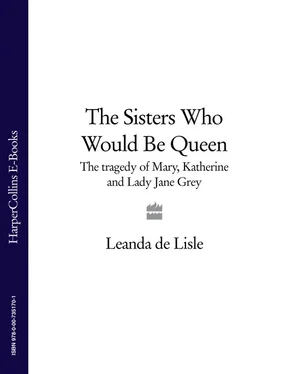The principal provisions of the will had been confirmed already under the third Act of Succession in 1544. Edward was bequeathed the throne followed by any children Henry had with Catherine Parr. The crown then passed to Edward’s illegitimate half-sisters, Mary and Elizabeth. At that point, however, there was a dramatic change in the line of succession. Just as Henry had ignored in 1544 the common laws on inheritance that excluded illegitimate children from the throne, so he had now refused to be bound by the tradition of primogeniture. The entire Stuart line of his eldest sister, Margaret of Scotland, was excluded from the succession. In the event of the death of his children without heirs, the crown was settled instead on the descendants of his younger sister, Mary Brandon, Duchess of Suffolk. At the stroke of his pen her granddaughters, Lady Jane, Katherine and Mary Grey were named the heirs to Elizabeth.
Henry never chose to explain why he had excluded the Stuarts in favour of the Brandon line. The Kings of Scotland had, however, been enemies of England for generations. Henry had hoped to find a solution to their centuries of warfare in betrothing the infant Mary Queen of Scots to Edward. When the Scots rebuffed him, Henry was faced with the prospect of their Queen being married to a European prince or a Scottish nobleman, and, either way, he did not want to risk England falling into foreign hands. It was to that end that he had made his daughters’ inheritance provisional on their taking a husband in accordance with the wishes of the Privy Council. Curiously, his will did not insist on a similar rule for the Grey sisters. Perhaps he assumed that Frances would have a son or grandson by the time his line was extinct. It would explain why her name was overlooked in the will. It is also possible, however, that Henry’s decision was influenced by his mistrust of her husband.
Harry Dorset was described by a contemporary, as ‘an illustrious and widely loved nobleman’, much admired for his learning and his patronage of the learned. 3 But as the rich husband of a royal wife, Dorset did not need to work hard for the status he held, and he had grown lazy and uncompromising. Although he had fought for the King in the wars with France, he had done little more than the minimum required of a nobleman. He preferred to leave the business of fighting to his younger brothers, Lords John and Thomas Grey. Nor was he suited to the snake pit of court politics. Remembered in the seventeenth century as ‘upright and plain in his private dealings’, he hated the dissembling that was part of court life. He had all the arrogance of the ideologue and an imperial ambassador described him a few years later as being without sense. He was happiest with his books, or in the company of ‘good fellows’, men who enjoyed a day’s hunting and a game of cards. This was not the kind of man Henry respected and the new Protector Somerset had no more use for him than the late King had had. 4
Somerset was a successful soldier-politician, on whom Henry had relied heavily in the last years of his reign. He was also emerging as a high-minded evangelical, and became known later as ‘the good duke’. Unfortunately this was how he saw himself. The portrait in which he sports a white suit and golden beard, like some heavenly princeling, encapsulates his self-image perfectly. Harry Dorset was not, however, the only member of the extended royal family, to resent Somerset’s power and arrogance. King Edward’s younger uncle, Thomas Seymour, was already looking to Dorset for a political alliance against his older brother. Described by his servant, Sir John Harington, as a fine soldier and a dashing courtier, Thomas Seymour had a magnetic voice, ‘strong limbs and manly shape’. Women fell for him, and men admired him: indeed, once they had succumbed to his charm they never forgot him. Even thirty years after his death his former entourage was bound in friendship by his memory, and ‘the best of them disdained not the poorest’. 5 In common with the protagonists of Greek tragedy, however, Thomas Seymour also possessed a fatal flaw: greed and of the most dangerous kind - the greed for power. Somerset had tried his best to engage Seymour’s support for his Protectorship. The younger brother had been brought on to the Privy Council, given the title Baron Seymour of Sudeley, and made Lord Admiral. What the new Baron Sudeley had hoped for most, however, was the post of Governor of the King’s Person, which would have allowed him to share the power of the Protectorship. And in this he was thwarted. Few others wished to see such a division of authority, and so in March, a month after the coronation, Somerset took the post for himself. A furious Sudeley was now determined to block any further advance by his brother, while continuing to seek power for himself. But to achieve this he needed first to raise his profile within the royal family.
Since January Jane and her sisters had seen a new and increasingly regular visitor to Dorset House on the Strand. Jane would have recognised him as a man about court: he was Sudeley’s gentleman servant, John Harington. A landowner and man of considerable subtlety and intelligence, Harington had been sent to prepare the ground for what Sudeley called a ‘friendship’ with Dorset.
Sudeley, meanwhile, was wooing Henry VIII’s widow. Catherine Parr had been in love with Sudeley before she had married Henry and now she was free to make her own choice she clearly found him irresistible. Within weeks of the King’s death the handsome Lord Admiral had the Queen dowager ‘under the plummet [duvet]’ at her manor in Chelsea. They married in secret in May 1547, shortly after she was given the care of her stepdaughter, the Princess Elizabeth. Over the following weeks, as Sudeley saw the huge influence his new wife had over Elizabeth, it struck him that the wardship of the next in line to the throne, Lady Jane Grey, would also be valuable. Notably, Edward’s heirs were all female. The entire political system, the stability of England depended on a series of women and girls and, whether adult, like Catherine Parr and the Princess Mary, or children, like the Princess Elizabeth and Lady Jane Grey, they were, to Sudeley, beings to be used and manipulated.
Sudeley had often noticed Jane Grey about the court. She appeared rather small, but her dark brows and eyes, which were ‘sparkling and reddish brown in colour’, suggested a lively spirit. He now began to watch her with closer interest, observing her playing and talking with the new King. An audience with Edward was always a formal affair, but as Jane Grey’s cousin, Jane Dormer, recalled, it was still possible to spend many happy hours with him, ‘either in reading, playing or dancing’. Edward was universally considered ‘a marvellous, sweet child, of very mild and generous condition’, and Dormer recalled how he would call her ‘my Jane’, and, when she lost at cards, he would comfort her: ‘Now Jane, your king is gone, I shall be good enough for you.’ 6
As similar scenes were played out under Sudeley’s gaze, he realised that Lady Jane Grey, with her royal blood, could one day be more than a playmate for Edward. She could become the King’s wife, a possibility that served his purposes well. Sudeley knew, or suspected, that Somerset hoped to see Jane Grey married to his eight-year-old son, Edward Seymour, the Earl of Hertford. 7 He hoped that if he could persuade Jane’s father to make her his ward, he would be able to thwart his brother’s ambitions in this regard and gain some control over whom Jane did marry. There would be many powerful people who would want her as a bride - all useful allies in the struggles ahead.
As Sudeley knew, Dorset had not been treated well by the Protector. When Catherine Parr’s courtly brother, William, had been made Marquess of Northampton it was said it had been done not so much to promote Northampton as to demote Dorset, who was, until Northampton’s election, the only marquess in England. This view appeared to be confirmed in March, when Northampton had been raised to the Privy Council, and Dorset had not. Harington was instructed to assure Dorset that, as the King’s second uncle, Sudeley was well placed to do him the favours the Protector denied him. 8 When, during one of his subsequent visits to his London home, Dorset confirmed his willingness to be Sudeley’s friend and ally, Harington seized his opportunity. The most appropriate mark of this future friendship, he said, would be if Dorset were to send Jane to live in Sudeley’s household as his ward. At that, however, Dorset balked.
Читать дальше












